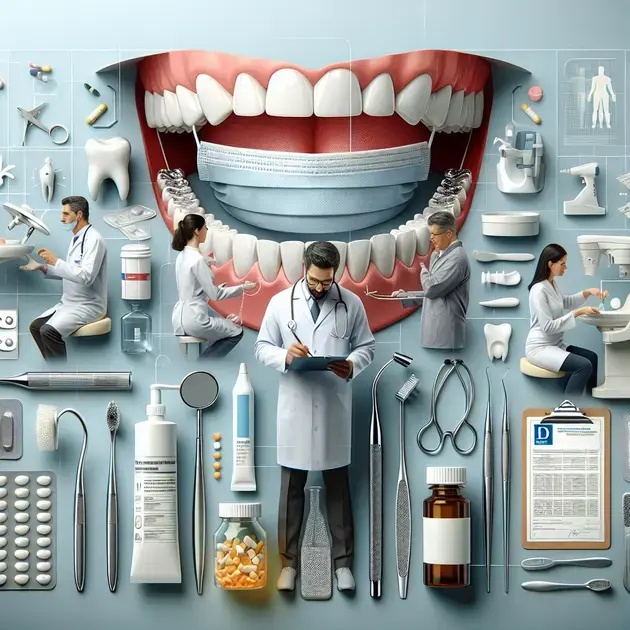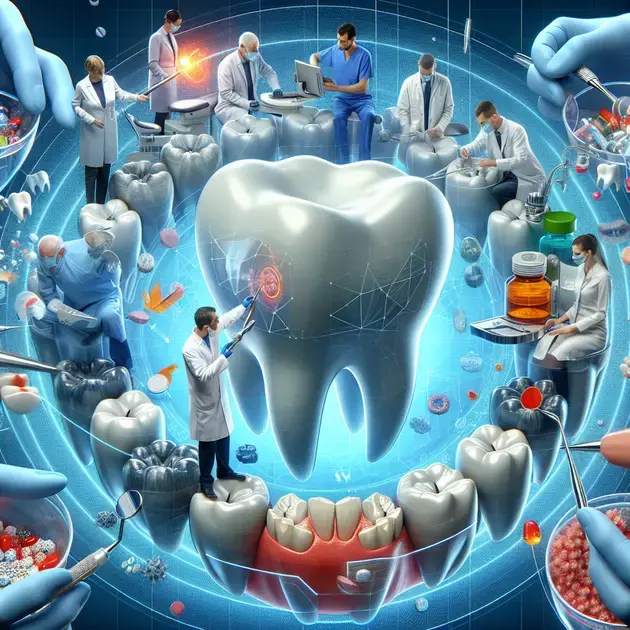Effective medication plays a crucial role in managing periodontitis, a serious gum infection that damages the soft tissue and destroys the bone supporting your teeth. In this comprehensive guide, we will explore the various treatment options available to combat periodontitis and restore oral health.
With advancements in dental research and technology, healthcare professionals now have a wide array of effective medications at their disposal to address periodontal disease. From antimicrobial mouth rinses to antibiotic medications, this guide will provide valuable insights into the most successful treatment strategies for periodontitis.

Effective Medication for Periodontitis: An Overview
Periodontitis is a serious gum infection that damages the soft tissue and destroys the bone that supports your teeth. It can lead to tooth loss if not properly treated. The most effective medication for periodontitis is antibiotics, which can help to reduce the bacteria causing the infection and control the inflammation. These medications are usually prescribed by a dentist or periodontist after a thorough examination.
To access information on different antibiotics used for periodontitis treatment, you can visit reputable healthcare websites such as WebMD or Mayo Clinic. These websites provide detailed information on the types of antibiotics, dosage recommendations, and potential side effects. Additionally, you can download the apps “Epocrates” or “Medscape” for quick reference on antibiotic medications and their uses.
It’s essential to follow the prescribed medication regimen strictly to ensure the best results. Make sure to complete the full course of antibiotics as directed by your healthcare provider. In case of any allergic reactions or severe side effects, contact your dentist immediately for further guidance and alternative treatment options.
Regular dental check-ups and cleanings are also crucial to prevent the recurrence of periodontitis. Brushing and flossing daily, along with maintaining good oral hygiene practices, can help to support the effectiveness of medication in treating periodontitis.
By following the recommended treatment plan and utilizing the prescribed medications effectively, you can effectively manage periodontitis and improve your oral health in the long run.
Understanding the Importance of Treatment Options
When dealing with periodontitis, understanding the importance of treatment options is crucial for successful management of the condition. Various treatment options are available, including scaling and root planing, dental surgery, and antibiotic therapy. Each of these options plays a significant role in addressing the different stages of periodontitis and restoring oral health.
To explore detailed information on these treatment options, you can visit the American Dental Association (ADA) website or the National Institute of Dental and Craniofacial Research (NIDCR) website. These resources provide in-depth explanations of the procedures involved, recovery times, and potential outcomes.
If you prefer a more interactive approach, you can download the app “Dental Patient Education” for comprehensive guides on periodontitis treatment options. This app offers visuals and videos to help you better understand the different procedures and make informed decisions about your oral health.
Consulting with a periodontist or dental specialist is essential to determine the most suitable treatment option for your specific case. They can assess the severity of your condition, discuss the available options, and create a customized treatment plan tailored to your needs.
Education and awareness about the importance of treatment options empower individuals to take control of their oral health and make informed choices that promote long-term well-being.
Exploring Successful Strategies for Restoring Oral Health
Restoring oral health after experiencing periodontitis requires a comprehensive approach that combines professional treatment with diligent oral care practices. Successful strategies for restoring oral health include regular dental visits, proper oral hygiene, and lifestyle modifications to support gum health.
Websites such as Colgate and Oral-B offer valuable insights into successful strategies for restoring oral health after periodontitis. These resources provide step-by-step guides on maintaining oral hygiene, choosing the right oral care products, and incorporating healthy habits into your daily routine.
For a more personalized approach, consider using the app “MyDental Clinic” to track your oral health progress and receive reminders for dental appointments and self-care routines. This app can help you stay on top of your oral health goals and maintain consistency in your efforts to restore gum health.
In addition to professional guidance and self-care practices, adopting a balanced diet rich in nutrients that support gum health is essential for oral health restoration. Foods rich in vitamin C, calcium, and antioxidants can aid in gum tissue repair and strengthen the immune system to fight off infections.
By combining these successful strategies, individuals can effectively restore their oral health, prevent future complications, and enjoy a healthy smile for years to come.

Understanding Periodontitis Treatment Modalities
When it comes to treating periodontitis, there are several effective treatment modalities available. One common approach is scaling and root planing, which involves deep cleaning to remove plaque and tartar from below the gumline. This procedure helps to reduce inflammation and prevent further progression of the disease. Another option is surgical intervention, such as flap surgery or gum grafts, which may be necessary for more severe cases.
Antibiotics are often prescribed to help control bacterial infections associated with periodontitis. These medications can be taken orally or applied directly to the affected area. In some cases, laser therapy may be used to target and remove infected tissue while promoting the growth of healthy gums.
Patient education is also a key component of periodontitis treatment. Dentists and hygienists provide guidance on proper oral hygiene practices, such as brushing and flossing techniques. They may also recommend lifestyle changes, such as quitting smoking and following a balanced diet, to improve overall oral health.
In some advanced cases, periodontitis may require ongoing maintenance and monitoring. Regular dental visits for cleanings and check-ups are essential to keep the disease under control and prevent recurrence. Overall, the successful treatment of periodontitis involves a combination of professional care, patient education, and diligent home care.
Effectively Managing Medication Compliance
Medication compliance is crucial for the successful treatment of various medical conditions, including periodontitis. Patients must follow their prescribed medication regimen consistently to achieve optimal results. One key step in managing medication compliance is clear communication between healthcare providers and patients.
Healthcare professionals should clearly explain the importance of medication adherence and address any concerns or barriers that may affect compliance. Patients should be educated on the potential benefits of the prescribed medications and any possible side effects to watch out for.
Using reminders, such as pill organizers or smartphone alerts, can help patients stay on track with their medication schedule. It is also important for patients to keep a record of their medication intake and report any missed doses to their healthcare provider.
Regular follow-up appointments with healthcare providers allow for monitoring of medication effectiveness and adjustment if necessary. Open communication about any difficulties or challenges with medication compliance is essential for developing strategies to overcome them.
Overall, effectively managing medication compliance requires collaboration between healthcare providers and patients, as well as proactive measures to address barriers and ensure adherence to the prescribed treatment plan.
Implementing Multidisciplinary Approaches for Optimal Treatment Results
Optimal treatment outcomes for periodontitis often benefit from a multidisciplinary approach involving various healthcare professionals. Dentists, periodontists, hygienists, and other specialists may collaborate to develop a comprehensive treatment plan tailored to the individual needs of the patient.
Communication and coordination between team members are essential to ensure that all aspects of the patient’s care are addressed effectively. Each professional brings their unique expertise to the table, contributing to a holistic approach to treatment.
Psychological support and counseling may also be beneficial for patients undergoing periodontitis treatment, especially in cases where anxiety or stress impact oral health. Integrating mental health professionals into the treatment team can help address these emotional factors and improve overall treatment outcomes.
Regular team meetings and case reviews allow for ongoing evaluation of the treatment plan and adjustments as needed. The multidisciplinary approach ensures that all aspects of the patient’s care are considered, leading to more comprehensive and successful treatment results.
By implementing a multidisciplinary approach, healthcare providers can optimize treatment outcomes for patients with periodontitis, addressing not only the physical symptoms but also the emotional and psychological aspects of the disease.
Conclusion
In conclusion, the effective treatment of periodontitis encompasses a range of modalities, from scaling and root planing to surgical interventions and antibiotic therapy. These approaches aim to reduce inflammation, control bacterial infections, and promote overall oral health. Patient education plays a crucial role in empowering individuals to maintain proper oral hygiene practices and adopt healthy lifestyle habits.
Managing medication compliance is essential for the successful management of periodontitis and other medical conditions. Through clear communication, education on medication benefits and side effects, as well as the use of reminders and patient monitoring, healthcare providers can enhance patient adherence to the prescribed treatment plan. Collaboration between healthcare professionals and patients is key to overcoming barriers and ensuring optimal outcomes.
Implementing a multidisciplinary approach in treating periodontitis can lead to more comprehensive and successful results. By involving a team of experts, including dentists, periodontists, hygienists, and mental health professionals, patients can receive holistic care that addresses not only the physical symptoms but also the emotional and psychological aspects of the disease. Regular team meetings and case reviews allow for ongoing evaluation and adjustment of the treatment plan, ultimately optimizing treatment outcomes and improving patient well-being.



